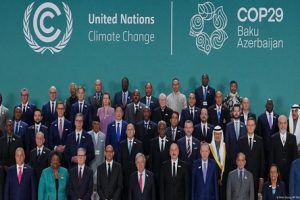
Ethiopia faces various environmental issues. The decline of forestation, soil erosion, biodiversity loss, air pollution, climate change, and soil fertility and water quality are among the most pressing issues.
Due to various factors, Ethiopia’s economy and ecosystem are weak and susceptible to climate change. Climate change, soil degradation, deforestation, biodiversity loss and ecosystem services, and pollution of land, air, and water are some of the environmental issues that challenge the country’s economy.
Ethiopia’s economy relies heavily on natural resources. In the short term, using these natural resources might result in significant economic gains. However, in the long run, unsustainable exploitation of these natural resources contributes not just to environmental deterioration but also to reduced economic growth and employment possibilities.
Ethiopia has thus prepared laws and rules to combat climate change and safeguard the environment. For example, Ethiopia’s environmental policy offers a framework for the nation’s sustainable growth and environmental conservation. Additionally, before projects are executed, developers are required under the nation’s environmental impact assessment declaration to evaluate and mitigate any potential environmental repercussions.
Another proclamation, the Climate Resilient Green Economy Strategy, seeks to encourage sustainable growth while lowering greenhouse gas emissions in critical sectors such as agriculture, forestry, and energy. The Forest Proclamation Law governs forest management and protection in Ethiopia, preventing deforestation and promoting sustainable forest management.
Furthermore, Ethiopia’s Wildlife Conservation Proclamation aims to save threatened animals and their natural environments. To provide water security and safeguard ecosystems, the Water Resources Management Proclamation simultaneously sets out rules for the sustainable management of the nation’s water resources. To encourage the development and use of renewable energy sources to lessen dependency on fossil fuels and combat climate change, the country has drafted the Renewable Energy Proclamation. These rules and regulations are enforced by federal government organizations and regional environmental bureaus that are established to protect and conserve the environment, forests, and so on.
However, while these laws, proclamations, and regulations are necessary to safeguard the environment, conserve biodiversity, and reduce climate change, their implementation faces some problems. For example, insufficient ability and resources, particularly financial resources, technical experience, and institutional capacity, restrict the effectiveness with which environmental laws and regulations are implemented and enforced.
Additionally, there are still issues that need to be addressed to increase the general public and policymakers’ understanding of the significance of environmental preservation and climate change mitigation strategies. These issues include a lack of education and awareness. Besides, the successful implementation of environmental laws and regulations is hampered as a result of the gaps in enforcement, careless enforcement methods, and poor monitoring and evaluation systems.
Apart from the adverse effects of climate change, droughts, floods, and irregular rainfall patterns which complicate environmental conservation efforts further, persistent deforestation and land degradation represent a major issue in several regions of the nation. Improved coordination and collaboration between government agencies, civil society groups, and other parties involved in environmental protection and climate change mitigation is necessary to address the problem of institutional coordination.
Taking these problems into account, the national environmental protection sector held a half-fiscal year plan implementation assessment meeting in Hawassa City. In the forum, officials and experts of the sector from all regions attended the meeting.
Ethiopian Environmental Protection Authority (EPA) Director General Engineer Lelise Neme said that stated that efforts have been made to ensure that proclamations and regulations enacted to rid Ethiopia of environmental pollution are being followed.
To achieve a pollution-free and environmentally sustainable Ethiopia, the government has directed its emphasis on coordinated public participation in the implementation of environmental protection laws. As a result, residents may live in a clean and unpolluted environment, public health is guaranteed, and sustainable national economic growth is strengthened.
In this context, efforts have been undertaken to raise public awareness of environmental concerns in addition to bolstering monitoring and control to guarantee compliance with environmental legislation in the middle of the fiscal year. She clarified that they were also assisted in creating and carrying out an integrated solid waste disposal strategy in the cities.
Furthermore, waste management and disposal in many manufacturing companies and service facilities have been closely regulated to ensure that they do not endanger people or the environment. This enabled the institutions to develop and implement an integrated waste disposal and chemical management strategy. She stated that the forum was designed to reaffirm the successes achieved in each area and to urge everyone to participate in future efforts to close the gaps.

Sidama National Regional State President Desta Ledamo, for his part, stated that it is critical to enforce laws and proclamations while also working together to minimize environmental pollution and land degradation. Because one institution’s efforts are insufficient to mitigate climate change, maintain biodiversity, save the environment, protect against natural resource depletion, and incorrect solid and sewage waste disposal.
More significantly, it’s critical to improve waste management and disposal in the city, boost green growth, and improve cooperation. In addition, collaboration is required to put the legislation passed for this purpose into effect, he said.
Sidama Regional States Forestry and Environmental Protection Authority Director General Shetaye Yumura elucidated that the region, by paying attention to environmental protection, ensuring green and sustainable development is being done actively and widely.
Thus, effective work is being recorded and to continue the results obtained in the future, it is appropriate to widely implement the laws issued in the field of environmental protection in the country, he explained.
Despite the various challenges, Ethiopia has made considerable steps in enacting laws and regulations to safeguard the environment and combat climate change. Currently, the government has made some progress, such as reforestation through the planting of billions of trees, sustainable land management, the development and implementation of renewable energy, and the design of climate change adaption strategies.
The country also establishes international relationships and collaboration with significant stakeholders, fostering community engagement in environmental protection and climate change adaptation programs while also allowing people to take ownership of sustainable development methods. These accomplishments show Ethiopia’s dedication to reducing climate change and protecting the environment. Therefore, Ethiopia should strengthen its efforts to protect the environment and advance sustainable development for future generations through stringent law enforcement procedures by building on these accomplishments and resolving the remaining challenges.
BY EPHREM ANDARGACHEW
The Ethiopian Herald March 17/2024





